Is It Better To Spend The Time Reading Books Or Watching Their Movies Counterparts?
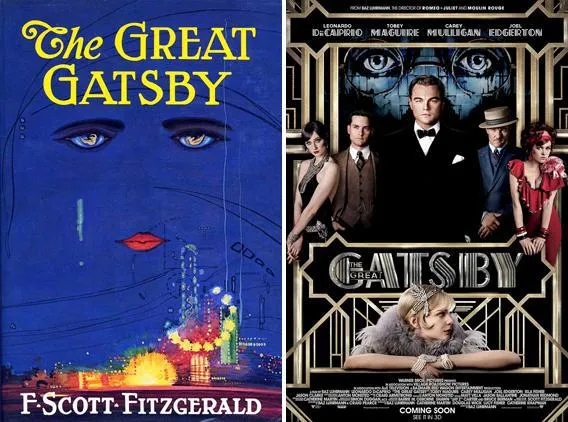
When I was in college, studying the English language during the third year, one of the subjects which I had to study was American literature. We had plenty of books to read as assignments, but the book that impressed me the most was "The Great Gatsby." I really liked the main character, Jay Gatsby, and how he wanted to repeat the past.
Honestly speaking there were some details that I had skipped when I read it, I didn't understand it properly, but I felt the emotion during reading. I didn't understand it completely during the seminar class however, I only understood it thoroughly, until I had to work on my diploma thesis, "Movies as a Way of Teaching Literature" during my Master's degree.
I saw the movie, and as a matter of fact, I didn't like it as much as the book, nevertheless, it made me comprehend elements that I had skipped from the book. Both books and movies are a perfect combination to teach literature as they complete one another, furthermore, both have their advantages and disadvantages.
Books and movies are a source of entertainment, a part of our upbringing, how kids, teens, and young adults spend their time. Both books and movies play an important role in the education of future generations, their mentalities, and shaping their character. So it is good to know and learn about the multidimensional influence they have on us.
Why are books so important to us?
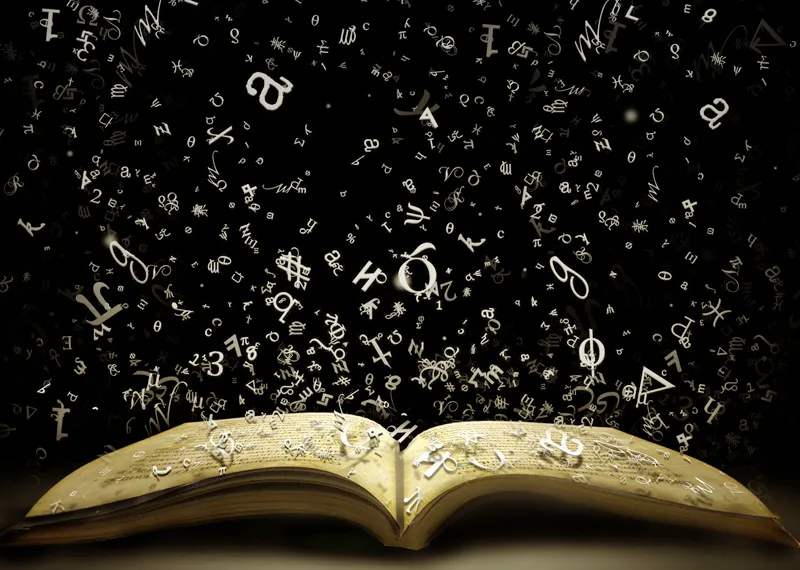
Both books and movies are a great source of learning and entertainment, books give us more details, develop our imagination and brain functions, whereas movies develop social life among friends and are one of the best forms of entertainment to the late generations, and I am sure it is going to be so for times to come.
The benefits of reading books are numerous. It is enough to say that books have been in circulation perhaps since mankind invented writing. Books have served us for centuries and thousands of years, while movies are an invention of the XX century. Books have served us to learn everyday functions and activities. Through them, we have learned to live and live meaningfully.
Books have served us to save the information, they are a source of spiritual guidance for a happy and successful life, providing life lessons from the past because through writing down our thoughts, they are preserved somewhere safe and so they become immortal.
Our love, prayers, and plenty of advantageous instruction are available through books. Faith, beliefs, and possibilities about the future can be found in books and the list goes on. It is for the limitless benefits books have, they are rightfully called a man's best friend.
Reading is essential for the child's mental and emotional growth. It develops in them critical thinking skills. There is a saying: "A child who reads is an adult who thinks."
Books have neurological benefits in children's life, because parents interact with their kids, through talking, singing, and reading strengthens the brain cells by making new connections. Reading has an immense impact on the child's development of their cognitive skills.
Reading during childhood supports academic success and a love for learning for kids. They improve their speaking and language skills, finding it easier to learn and be fluent in many languages. Reading books helps children to have a longer attention span, focus, and concentration. Reading helps to become a better listener, and early readers are not just lifelong readers, but also lifelong leaders too.
Children who read at an early age develop individuality and poise. Reading promotes maturity and curiosity about people, places, and things around them. as a result, children develop creativity and imagination. Reading has always enhanced creativity. Many CEOs, directors, and any other kind of leaders are avid readers. Bill Gates reads 75 books per year, Toni Robinson even more.
Another factor worth mentioning is that books can develop cognitive abilities and memory. There are scientific theories that keeping your brain engaged by reading can slow down or prevent Alzheimer's and Dementia. Studies reveal that reading 15 pages per day can improve cognitive muscles and boost creativity
Equally important Fisher Center for Alzheimer's Research Foundation believes that reading from childhood and carrying such a habit to adulthood can prevent Alzheimer's and Dementia entirely.
What can a book do that its movie counterpart can't?
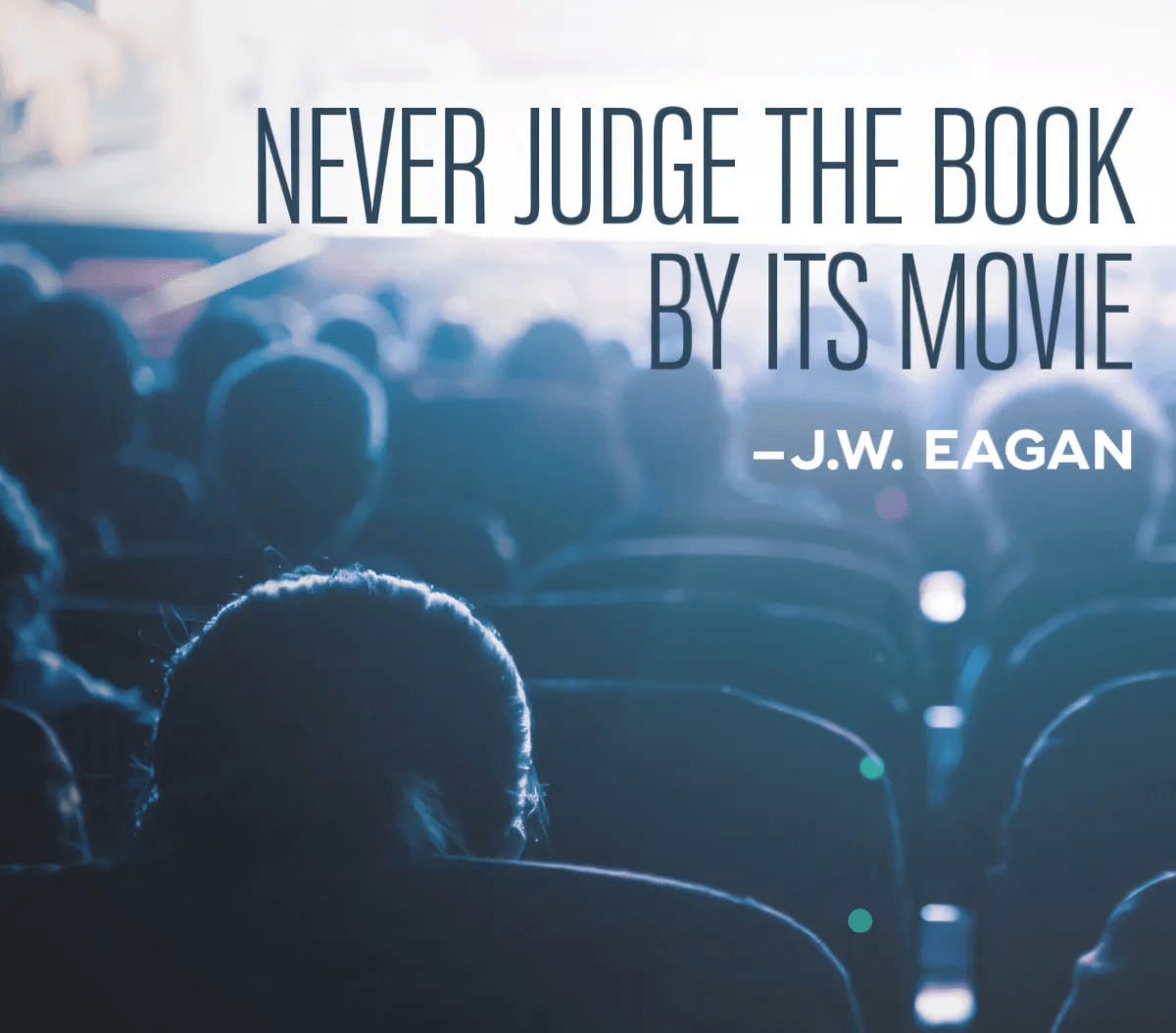
We live in the twenty-first century, a time of great advancement in technology and art. Movies are the number one art masterpiece that is abundant in our time. We have great movies and TV series. Despite this huge development of cinematography, novels still have a strong position in face of this challenge. John Gardener referred to this as a "vivid, continuous dream", of fiction.
Good novels can conquer a reader's fantasy up to the extent that putting them down is like saying goodbye to a very dear friend. Novels fulfill a very basic human need. Their art form offers a way of living life not available in any other medium.
Movies are a wonderful form of art as well, they give us a gripping, emotional, and even a cathartic experience, but it lasts for a very short time. On the other hand, the best novels create a connective electrical current, they connect into a living conversation between two minds, that of the reader with that of the writer.
If someone wants to go in-depth into the story, then he has to read every element of the book in its smallest details, such as the characters' feelings, figures of a language, and rich moments. A movie can last only 2 hours, whereas a book takes a longer period of time to read, it might take a few days, thus books provide more entertainment in the quantitative proportion.
Robert Stone, a great novelist once said that we all have two stories: the one we carry inside, and the other one we experience in the material world. Where both these stories meet is the domain of literature. Movies can't capture the interior story.
The great writer Ernest Hemingway wrote:
"All good books are alike in that they are truer than if they had really happened and after you are finished reading one you will feel that all that happened to you and afterward it belongs to you; the good and the bad, the ecstasy, the remorse and sorrow, the people and the places and how the weather was."
Movies cannot give such a sensation - not in an all-encompassing way- for this reason novels continue to play the same role, and it is worth writing one. Writer Tim Weed gives the main distinctions between these sensations:
- Novels give us friends for life. When you read a novel, it takes a considerably long time, spending countless hours or whole days with its characters. We live the story through them - we experience with their minds. There are cases we identify ourselves with the characters, our thoughts, emotions, and visions become theirs during reading. Movies don't give such an effect, and when it does, it never happens with the same power or longevity. The characters of the novel enter into our consciousness forever, becoming friends for life.
- Novels let us inhabit other worlds. In a novel we dwell within the setting, our fantasy generates a whole new imagined reality. For this reason, novels can give us the sensation of being to Middle Earth, or Sahara, or 16th century Britain or post-apocalyptical America, rather than just witnessing it as a dazzling spectacle on a screen.
- Novels connect us with our consciousness. We travel through the worlds of novels in the company of intriguing characters going through the same life-changing experiences as they. It can enter deeply into your consciousness and enlarge your perspective. Reading creates empathy, they increase compassion and understanding. They can make us see the world from different angles, it can make us define our existence. Novels can be our greatest teachers, comforters, they enrich our lives and give us intentional meaningful lives.
Novels can be the greatest teachers ever. They give us the skill to live a rich, independent intentional life.
What is the difference between reading a book and watching its movie adaptation?
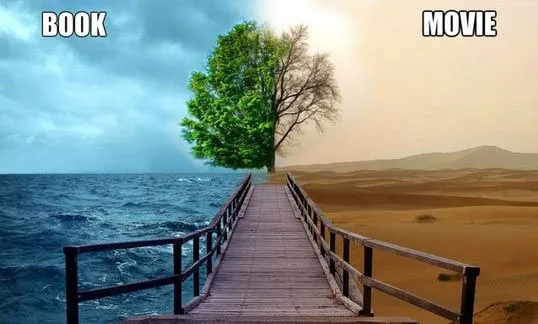
Movies are a relatively new invention if we compare them with books, but they cannot replace them completely, neither can books play the same function a movie can, nor a movie can be a substitution for a book.
Whenever movie producers try to render a book into a movie, trying to stay faithful to the words on the page as much as possible, they always fail. Due to the common expectations people have for movies based on books, we tend to rush when we make our judgment when we claim that books are naturally superior to their movie adaptation.
Both movies and books are two distinct media. For instance, we can never say that Tarantino's "Pulp Fiction" is better than Vonnegut's "Slaughterhouse-Five," because one is a movie, while the other is a book. How can we judge them using the same criteria"? If you do such a thing, we forget the enormous portions of what a movie and a book are. They both tell the same story but in different ways.
We cannot judge a movie with the same criteria we judge a book and vice versa. We can indeed say that one tells the story better than the other, but I think we cannot look at them as two equal stories entirely but as two separate ones.
Why do movies matter?
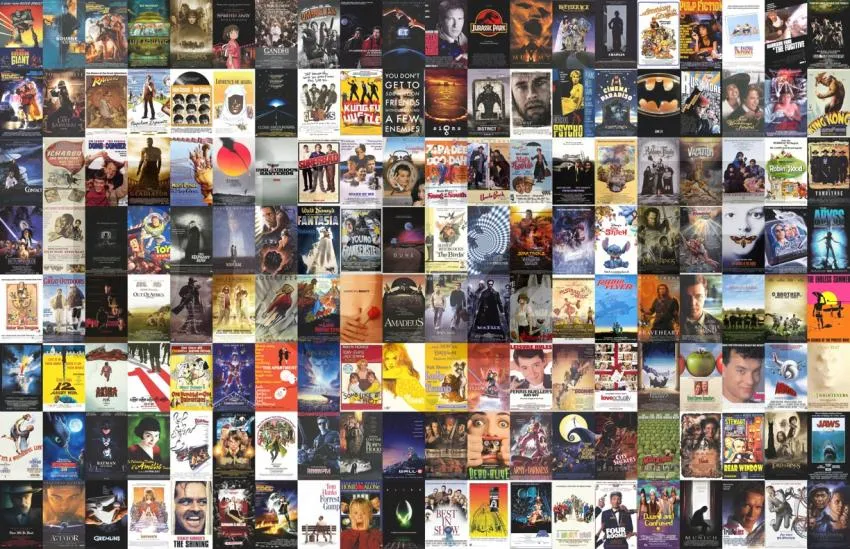
People take movies for granted as just pure entertainment, but they are not designed only to entertain people masses, without any further role and importance. People may ask, whose life is going to change by movie hero? But nobody can deny he/she has never been influenced by a film in a profound and meaningful way.
Just imagine what kind of life would you have without movies. Indeed, they do not play an important role on a day to day life, but highly probable that they have an impact on you over the years.
Movies enable us to understand ourselves and the world we live in which can shape our lives. Movies have the ability to entertain us in a consumable way, they communicate messages effectively which have a deep meaning for individuals.
Movies develop in us empathy.
Every human being has the ability to empathize with others. However, circumstances influence that feeling on us. We can get information through the community we live in, our life experiences, and movies too. Since when we were children, we have seen movies that have made us live the experience and feel the feelings of others. Kids can be educated through Disney cartoons, they can learn empathy, through scenes of loss and grief.
As we grow older, movies continue to play the role in helping us comprehend the struggles of individuals other than ourselves, thanks to the stories of people and their life situations. Some people ignore these feelings, but still, you had such an experience while watching movies in your lifetime.
Movies are a source of education.
There are very few people who believe movies are the best way to learn about anything you want. It may be true, only if you are watching an in-depth educational documentary. In that case, you might only scratch the surface of the subject. This doesn't exclude the option that movies can be a fantastic educational tool at certain times.
Films can teach us by introducing us to subjects we had no idea about before or had very little information about it. It can be anything in life, such as a way of living, a field of study, a period of time in history - by watching such stories we see something new and explore things we didn't know.
Movies are a new creative expression.
Movies have become one of the best forms of creative expression, by giving us scenes we have never seen before. You may think it might be true for the artist, and very unlikely for the viewer. Looking at someones' imagination at work can be very powerful. Let's mention the short film "The Arrival of a Train at La Ciotat Station" when it was shown to the public in a theatre in 1896, while people were looking at the train coming towards the screen, they ran away for safety.
Since then movies have shown us things no one could ever have thought before. For example, "Star Wars" and "Jaws" inspired the next generation of filmmakers. Artists use their talents and vision to work, and when they do it successfully, it inspires our own creativity and imagination.
What can a movie adaptation do that a book cannot?
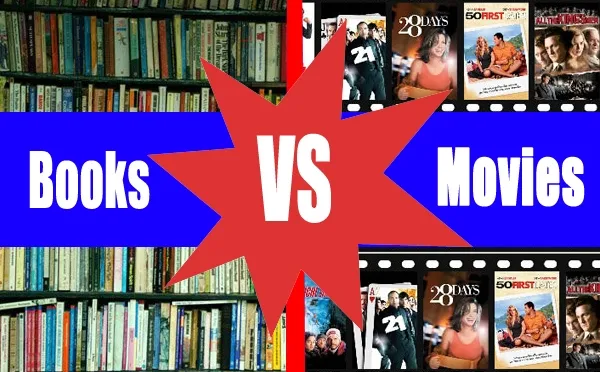
Movies have started to take place off the written word, they are far more entertaining than books, and continue to play an important role in shaping our collective consciousness. Movies are becoming the main source of spreading information and influencing the audience. They educate society and add to our shared culture.
Due to their inherent nature, movies can exercise their effectiveness and influence on the public. They are a visual stimulus, not a textual one, consequently, they display their content much more quickly than a book can. They can reach and inform a larger audience, furthermore, the images are easier to remember than what you can imagine through reading.
A picture is worth 1000 words, and a film plays at a rate of 24 frames per second making a movie such as "Argo" of Ben Affleck, 120 minutes long take the place of 200, King James Bibles.
This doesn't mean that a movie is definitely better than a book, just because of its ability to display more content. This feature only explains the tendency people have to learn better from movies rather than books. Watching a movie is more passive than reading, but it imparts its content more easily and consumable than a book.
They are tangible, visual, and compact if we compare them with written works, making them easier to remember. If we complain about the popularity of movies relative to books we ignore the potential benefits they have for society.
Critics say that movies can be a source of misinformation: not all historical movies are accurate. There are politicized documentaries such as "2016: Obama's America" and Michael Moore's "Fahrenheit 9/11", which are characterized by a misinterpretation of facts. On the other hand, history books can be misinterpreted as well.
To leave inaccuracies aside, the film industry can reshape historical narratives in the people's consciousness, which books can't. Whenever people think of RMS Titanic, they remember the main characters Leonardo DiCaprio and Kate Winslet who struggle to survive in the icy cold water of the Atlantic. Or Spielberg's Lincoln reshapes the story of Abraham Lincoln's presidency the same as Olive Stones' JFK presents Kennedy's assassination to the American public.
These films show how they can popularize history, educate the public and reshape our collective culture.
Final thoughts
No one can say that books are greater than movies or movies will replace the written word. They both have their pros and cons.
People have different tastes regarding the consumption of literature materials. There are cases that books and movies that play the same role especially when they have a similar story to tell and related content. The debate continues if reading books is better than watching movies.
Cinema can have a great influence on people's lives and society. The movies we see, the songs we hear, and the books we read shape us into what we are. Movies reflect a writer's imagination, they are fake fantasy, unless it's a biopic. In such cases, youngsters need to understand real life is not like the fantasy in the movies. They must gain only the positive aspects of cinema.
Movies have proved to have a greater impact on the viewer's mind, especially kids and youngsters. For this reason, it's important to display content suitable to society.
Everything has two aspects, a negative one and a positive one. When we watch a movie, we must allow them to affect us negatively. That's why everything must have its limits. Spending money on movies worth watching is not a bad thing, but we must avoid getting addicted to them so that we do not miss out on important things in our lives.
Scientists of Standford University have proven to us that reading improves cognitive abilities and brain function of the brain. Movies don't do that.
Books will always remain an eternal source of knowledge. Books of the past, the classics still haven't lost their values, they continue to stay more actual than ever. Books portray the human soul, mind, and character, providing us with experience and insight. We must bear in mind that sacred scriptures, such as the Bible, the Qur'an, and Torah, have played a tremendous role in people's lives and their outlook throughout history.
Whereas books will always remain a treasure for an infinite time, they provide us more details, and compared with a movie, a book will remain highly informative and educative. Authors are not constrained by time and money as movie producers are. Technology doesn't play a role in the effectiveness of a book because a book's value depends not on the written paper, but the content. Books will continue to play the same role for times to come.
In conclusion, we still cannot come up with a definite result which media is better over the other. It all varies upon people's choice, personality, and age. The old generations are more prone to books, while the young generations prefer to watch movies. Movies and books present the same story differently, and they provide some similar expectations and main ideas. It is best to take advantage of both of these media.
References:
1minutebook staff. Books vs Movies: Pros and Cons. 1minutebook. September 18, 2020. https://1minutebook.com/books-vs-movies-pros-and-cons/#conclusion
BoomersPlus Editor. Why Movies Are Important. BOOMERSPLUS. September 16. https://www.boomersplus.com/why-movies-are-important/
Drucker, Jacob R. Watching, Not Reading. The Harvard Crimson. November 9, 2012. https://www.thecrimson.com/article/2012/11/9/movies-books-harvard/
EssayBasics. Book vs Movie (Essay/Paper Sample). EssayBasics. May 11, 2017. https://blog.essaybasics.com/book-vs-movie-essay-paper-sample/
Marie, How Reading Books Is Different From Watching Movies. COMPLETE LITERATURE. August 7, 2019. https://completeliterature.com/how-reading-books-is-different-from-watching-movies/
Ph.D. Essay. Impact of Cinema in Life Essay. Ph.D. Essay. August 10, 2020. https://phdessay.com/impact-of-cinema-in-life-essay/
Sikder, Sanjukta. What is the importance of reading? JBCN International School. October 2019. https://www.jbcnschool.edu.in/blog/importance-of-reading/
Taylor, Carly. What movies can do that books cannot? The Standford Daily. February 1, 2019. https://www.stanforddaily.com/2019/02/01/what-movies-can-do-that-books-cannot/
UKESSAYS. Books vs Films: Comparision. UK ESSAYS. July 29, 2021. https://www.ukessays.com/essays/english-language/books-vs-films-comparison-5860.php
Weed, Tim. What Novels Can Do That Movies Can't.TIM WEED. n.d. September 18, 2020. https://1minutebook.com/books-vs-movies-pros-and-cons/#conclusion
Opinions and Perspectives
Love how books let you set your own pace and really digest the material.
Interesting how movies can shape collective memory more effectively than books.
That quote from Hemingway about books becoming part of you really resonates with my experience.
I appreciate how movies can bring literature to people who might otherwise never experience those stories.
Books help develop vocabulary and writing skills in ways movies simply cannot.
The article's point about movies being more memorable visually is true for me. I can picture scenes years later.
Each format serves different purposes. I wouldn't want to live in a world without either one.
The way books slow us down in this fast-paced world is actually a benefit, not a drawback.
Sometimes I watch the movie first to get a framework, then read the book for deeper understanding.
Books have stayed relevant for thousands of years for good reason. They offer something timeless.
The social aspect of movies shouldn't be underestimated. They create shared cultural touchstones.
Reading definitely requires more effort, but I find it more rewarding in the long run.
Movies can introduce complex topics to people who might never pick up a book about them though.
The article's comparison to friendship is spot on. Book characters really do become like old friends.
I find myself more emotionally invested in books because I spend more time with the characters.
Movies do have an advantage in teaching visual concepts though. Try describing a sunset versus showing one.
The neurological benefits of reading are convincing. I should probably swap some screen time for book time.
Never thought about how movies are constrained by time and budget while authors can write freely. Good point.
That early cinema story about people running from the train film is incredible! Shows how powerful visual media can be.
Books give you more freedom to interpret things your own way. Movies kind of force their interpretation on you.
The article's point about old generations preferring books while young ones prefer movies rings true in my family.
Interesting how they mention movies reshaping historical narratives. Titanic is such a perfect example of this.
The impact on kids is really important to consider. Reading to children has benefits that watching movies with them just can't match.
I love what the article says about novels creating a conversation between reader and writer. That's so true.
A well-made film can deliver an emotional punch in just two hours that might take days to build in a book.
Anyone else find themselves disappointed when movie adaptations change major plot points from books?
Movies can show us things books can never fully describe though. Think about all those amazing special effects!
Reading definitely helps develop empathy in a unique way. You spend more time in characters' heads.
The article makes a good point about not comparing them with the same criteria. They're different mediums with different strengths.
Let's be honest, sometimes after a long day, watching a movie is just easier than reading a book.
My experience matches what the article says about characters becoming friends for life. I still think about Scout from To Kill a Mockingbird regularly.
Does anyone else feel like they remember books longer than movies? The stories I read years ago stick with me more than films I've watched.
That statistic about 24 frames per second equaling multiple Bibles worth of content is mind-blowing!
Movies can be great for visual learners though. I remember concepts better when I see them played out on screen.
The point about sacred texts is important. Some things just need to be read and contemplated slowly.
Watching a movie is definitely more social. Nothing beats discussing a great film with friends right after watching it together.
I actually preferred the movie version of The Great Gatsby. The visuals and music really captured the roaring 20s atmosphere for me.
True about movies reaching larger audiences faster. My kids learned about historical events through films first, which sparked their interest to read more.
Books allow our imagination to run wild. I personally prefer creating my own mental images rather than having them served to me on screen.
The article mentions Bill Gates reading 75 books per year. That's inspiring! Though I wonder how many movies he watches...
As someone who teaches literature, I've found using both mediums really helps students grasp complex themes. They complement each other beautifully.
The scientific findings about reading improving cognitive function are fascinating. Makes me want to pick up a book right now!
Interesting point about movies being a more passive experience. I never thought about it that way but yes, books do require more active engagement from us.
Both have their place. I watched Lord of the Rings first and it got me interested in reading the books, which then gave me so much more depth and background.
When it comes to learning and retaining information, I find books much more effective. The slower pace helps me process and remember details better.
I disagree! Modern movies can convey complex emotions through music, cinematography and acting in ways books simply cannot. Sometimes a facial expression says more than pages of description.
The ability to read at your own pace is so valuable. I love being able to pause and reflect on certain passages, something you can't really do with movies unless you keep hitting pause.
The movie version helped me visualize the lavish parties better though. Sometimes seeing things brings a different perspective that complements what you imagine while reading.
I've always found books give me more time to really connect with the characters. When I read The Great Gatsby, I felt like I understood Gatsby's longing in a way the movie just couldn't capture.
